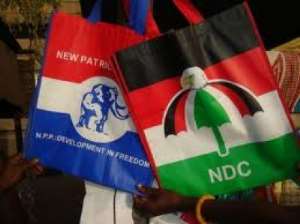
Public figures, especially the "politicians" act as if anything less than a win place them in an unfavorable position. Sometimes, I get overwhelmed from watching carefully and attentively how politicians become embroiled in matters and make statements which with – hindsight, should have been unsaid or – at best should only have been made by subordinates.
Although I firmly believe that it is best to be thought a fool than to open one’s mouth and prove it true, I have been guilty of a faux pas on one or two occasions; but I am not a public figure.
What I am saying is that, public figures sometimes need to place themselves less in contentious areas of public discourse, if there is a possibility that, their pronouncements will not lead to healing but will flame divisions.
At present, what seems to be the most important feature in the communication process is the practical use of (what I refer to) the “survival” concept called “producing persuasive arguments of deniability” – where in every case there is very nearly an impossible desire to be in a win-win state always.
In circumstances of such nature, public figures are likely to act, as if anything less than a win, places them in an unfavorable position, in relation to a state of being damaged, because those who would support them and with good reason, are aware of the benefits access they represent.
The working definition of producing persuasive argument deniability is a method or scheme to allow an authority to deny, in a persuasive argumentative manner, a responsibility contrary to law or discreditable acts carried out by subordinates.
In the persuasive argument deniability state, people say and do things which can be easily denied, that the denial will be taken as the truth by most people, who do not have the intellect to reason through and to understand objectively or realize that, the denial is a lie or a cover up.
However, it should not be imagined that persuasive argument deniability sets one free from the blame of responsibility. All it does is to pick out and emphasize an easily recognizable lack of being accountable.
Just alter or modify Factory’s Accountability and the art of persuasive argument deniability will express divergent views typically in a heated way that persuasive argument deniability is both private and public sector issue, “because it leaves open the door to abuse of authority and resources, shifting blame and deflecting accountability.”
Among the techniques used in producing persuasive arguments deniability are - offering a persuasive argument while setting up a defensive shield to deny any request or query (“I cannot be expected to recall all correspondence meeting my office”); attacking the credibility of the questioner rather than addressing the substantive issue; omission of information (what is not said rather than what is said); and use of a word (or words) to give delicately complex changes in meaning and enabling the use of ambiguous language to avoid committing oneself at a later stage.
One of the more familiar approaches by senior officials in both sectors is where you are required to communicate with subordinates so they can plausibly deny knowledge of the conversation or be able to say that the subordinate misrepresented their position. Among the names which have been linked to producing persuasive arguments deniability in one or more of its forms are: Asiedu Nketia; Kwesi Pratt; John Mahama.
The argument has been used, that, producing persuasive arguments deniability is intended to protect from the unfriendly or the rude effects on the leader from direct knowledge of unscrupulous behavior or some unsavoury plot, since it is not unknown to the boss and to be conveniently absent, when faithful followers hatched plots and introduced the devil to the details; case in point is the amplification from John Mahama on Isaac Adongo role in the Bigotry and scandalous "Akyem Mafia, Sakawa Boys, Grandpa Statement".
Serious consequences are likely to arise including loss of legitimacy, effectiveness, popularity, resources, and political stability when public figures avoid accountability and rely heavily on producing persuasive argument deniability.
Those who duck accountability and are willing to sacrifice the long term benefits of the greater number for the immediate short term gains of a few, stand to lose the trust of the very people that they need to follow them because while producing persuasive argument deniability works some of the time, it won’t fool all of the people all of the time.




 EC pays over GH¢69 million to 116,211 temporary staff for 2023 District Level El...
EC pays over GH¢69 million to 116,211 temporary staff for 2023 District Level El...
 Police directive to stop searches on foreign trucks raises security concerns — D...
Police directive to stop searches on foreign trucks raises security concerns — D...
 Stop checking Trucks bearing foreign plates — Police management to regional comm...
Stop checking Trucks bearing foreign plates — Police management to regional comm...
 ‘Stop extorting, harassing local truck drivers too’ — Ablakwa jabs Ghana Police ...
‘Stop extorting, harassing local truck drivers too’ — Ablakwa jabs Ghana Police ...
 ‘Of course, your misgovernance legacy deserves to be destroyed’ — Mahama replies...
‘Of course, your misgovernance legacy deserves to be destroyed’ — Mahama replies...
 I won’t protect your ‘legacy’ of corruption, arrogance – Mahama replies Akufo-Ad...
I won’t protect your ‘legacy’ of corruption, arrogance – Mahama replies Akufo-Ad...
 Depreciating cedi: We better adopt a currency board or official dollarisation – ...
Depreciating cedi: We better adopt a currency board or official dollarisation – ...
 Limited Voter Registration: Three people arrested for causing disruptions during...
Limited Voter Registration: Three people arrested for causing disruptions during...
 Inflation in April dropped to 25.0% – GSS
Inflation in April dropped to 25.0% – GSS
 The rumours did not emanate from us — Société Générale on purported exit from Gh...
The rumours did not emanate from us — Société Générale on purported exit from Gh...
